A mid-size or full-size pick-up truck with a towing capacity of at least 5,000 should be sufficient for towing a small to medium-sized travel trailer. For larger trailers, a heavy-duty truck with a towing capacity of 10,000 will do.
If you are in the market for a medium to large travel trailer or a robust fifth-wheel trailer, then you are likely looking to pair it with the right pickup truck. The Ford F-150, the Chevy Silverado, and the Ram 1500 are all popular half-ton trucks that can safely pull most travel trailers of around 6,000 pounds or less. However, they aren’t the only tow-capable trucks or vehicles for that matter that can tow a travel trailer.
In this article, you will find a detailed and simplified explanation of all the factors that go into picking the right size truck for towing a travel trailer. You will also learn tips we’ve garnered from experience that you can consider to save time, effort, and money.
Understanding Towing Capacity
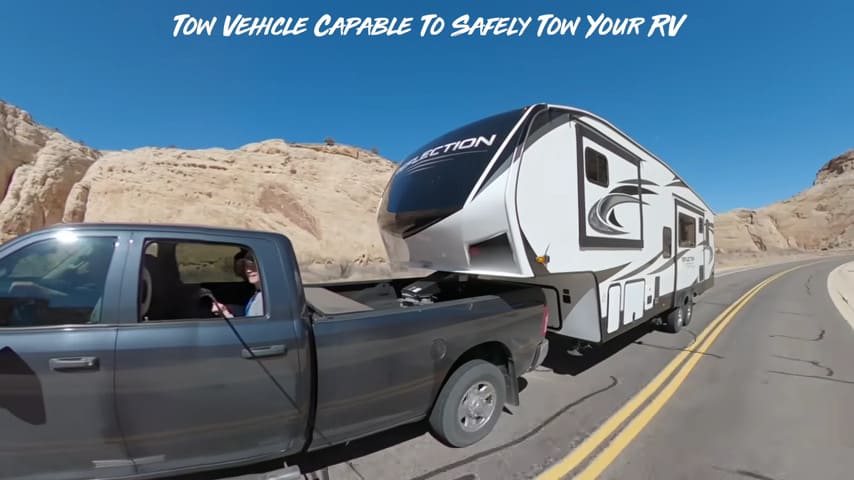
Towing capacity is a crucial factor when selecting a truck to pull a travel trailer. It is the maximum weight a vehicle can tow without compromising safety or performance.
The key components influencing towing capacity include the engine, transmission, frame strength, suspension, and braking system.
For example, the 2022 Ford F-150 with a 3.5L Ecoboost engine boasts a towing capacity of up to 14,000 pounds, thanks to its robust powertrain and chassis. Similarly, the Chevy Silverado 1500, equipped with a 6.2L V8 engine, can tow up to 13,300 pounds.
To determine the ideal truck size for your travel trailer, consider the trailer’s Gross Vehicle Weight Rating (GVWR) and the tongue weight.
The truck’s towing capacity should exceed the loaded trailer weight.
If your travel trailer has a GVWR of 10,000 pounds, aim for a truck with a towing capacity well above that figure. And factors like payload capacity and proper hitching systems are crucial for a stable and secure towing experience.
You will learn about all these in more detail as you continue reading.
Types of Trucks and Their Towing Capabilities
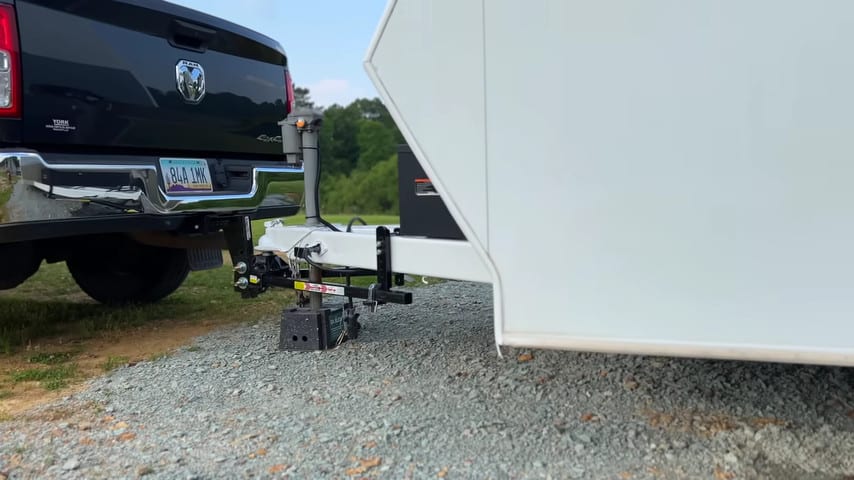
In the table below, we have differentiated between truck types, such as light-duty and heavy-duty, and their respective towing capabilities. This will give you a clearer idea of what size of truck should work for your trailer in terms of towing.
Here is the trailer towing capacity of the trucks available in the U.S.:
| Make & Model Of Truck | Maximum Towing Capacity |
| Ford F-150 Half-Ton | Max. towing capacity: 13,200 |
| Chevrolet Silverado Half-Ton | Max. towing capacity: 13,400 |
| GMC Sierra Half-Ton | Max. towing capacity: 13,400 |
| Nissan Titan Half-Ton | Max. towing capacity: 12,750 |
| Ram 1500 Half-Ton | Max. towing capacity: 9,370 |
| Toyota Tundra Half-Ton | Max. towing capacity: 10,200 |
| Ford Super Duty F250 Three-Quarter Ton | Max. towing capacity: 18,200 |
| Chevy Silverado 2500 Three-Quarter Ton | Max. towing capacity: 20,000 |
| GMC Sierra 2500 Three-Quarter Ton | Max. towing capacity: 20,000 |
| Ram 2500 Three-Quarter Ton | Max. towing capacity: 10,580 |
| Ford F350 One-Ton | Max. towing capacity: 21,200 |
| Chevy Silverado 3500 One-Ton | Max. towing capacity: 20,000 |
| GMC Sierra 3500 One-Ton | Max. towing capacity: 20,000 |
| Ram 3500 One-Ton | Max. towing capacity: 18,000 |
Matching Truck Size with Travel Trailer Weight
Many seasoned RV owners have argued that towing capacity is the least essential number when towing with half-tons — that payload is the number you really have to watch out for.
If you’re daily new to towing trailers, you need to consider the bigger picture.
Here are the most relevant factors to consider to correctly match a truck size with your specific weight of travel trailer.
Stay Within The Tow Vehicle’s Weight Rating
A quick flip through your intended pickup truck’s owner’s manual will give you the raw statistics on its towing capacity.
Just because a particular truck might have a towing capacity of 10,000 pounds doesn’t mean you can just hitch 9,999 pounds up to it and drive off down the interstate highway with a blissfully confident smile on your face.
The standard rule of thumb is that you should never put more than 80% of your pickup truck’s towing capacity on the back.
If a travel trailer’s gross vehicle weight rating or GVWR is more than 80% of the pickup truck’s towing capacity, then you are at real risk of having a problem when dealing with hills and wet or loose surfaces.
Overloaded trailers are also at increased risk of developing a hazardous situation with trailer sway at highway speeds.
Consider the Payload Capacity Of Your Travel Trailer
Payload capacity is the amount of weight a truck can carry, including passengers and cargo. If a car has a payload capacity of 1,800 pounds, subtract the tongue weight (let’s say 1,000 pounds) to ensure there’s ample capacity for passengers and additional cargo.
Most travel trailers have a payload capacity that’s listed right alongside the dry weight and gross vehicle weight rating.
This is the manufacturer’s estimated capacity of gear that the trailer’s suspension, tongue, and other components can safely handle.
Exceeding the payload weight or loading the weight unevenly in the travel trailer can be a safety issue; it can damage the tongue and the suspension and even cause a dangerous trailer sway problem when traveling at highway speed.
Meanwhile, Payload capacity also factors in liquid weights. This includes things like fresh water, gray water, and black water tanks, or even fuel tanks on a toy hauler travel trailer.
For the sake of easy math, assume that every gallon of water weighs in as 9 pounds. This is a little over the actual weight of a gallon of water, but it is always better to err on the side of caution.
Consider the Tongue Weight
Tongue weight is crucial for stability. For a trailer with a GVWR of 7,000 pounds, the tongue weight should ideally be around 700 to 1,050 pounds (10 to 15%). If it is too low, the trailer may sway; if too high, it could overload the truck’s rear side.
A weight distribution hitch can help manage this.
Watch this video to understand further how a weight distribution hitch can help manage tongue weight when pulling a travel trailer:
The Engine
What truck engine is better for towing travel trailers? Well, diesel engines used to be rarer in pickup trucks than gasoline. They usually were only limited to three-quarter-ton trucks or more extensive.
Today, more and more trucks and cars of all sizes are embracing diesel for their fuel efficiency and low-end torque.
This also makes diesel engines better at towing heavy travel trailers and fifth-wheel trailers.
The trade-off here is that diesel engine trucks tend to cost more. In some parts of the United States, diesel isn’t carried as much in typical gas stations.
So, you should preplan your fuel stops at truck stops that always offer diesel for commercial vehicles.
With a gasoline engine, you are going to have a lower initial purchase price, and you can trust that pretty much every fuel station you stop at will carry gasoline.
Check Hitch Compatability
Ensure the truck’s hitch is compatible with the trailer’s hitching system. Class III or higher pitfalls are standard for towing trailers like the Jayco Jay Flight SLX.
Confirm that the hitch’s maximum towing capacity exceeds the trailer’s GVWR. Alternatively, you can seek an RV dealer to get this done. However, the installation of a trailer hitch can cost more.
Review Axle Ratios
The axle ratio reflects a truck’s towing capabilities and determines the number of revolutions the wheels make for each turn of the driveshaft, influencing towing performance.
Higher axle ratios provide more towing power, enhancing the truck’s ability to handle heavier loads like travel trailers, especially in hilly terrains.
Higher ratios like 3.73 or 4.10 provide more torque for towing heavy loads.
Consider Your Trailer’s Length
If you have a more extended trailer, it can affect stability. In that case, you need a truck with an appropriate wheelbase.
A Ford F-250 with a longer wheelbase may be better suited for towing longer trailers for improved stability and control.
Safety Considerations in Towing a Travel Trailer
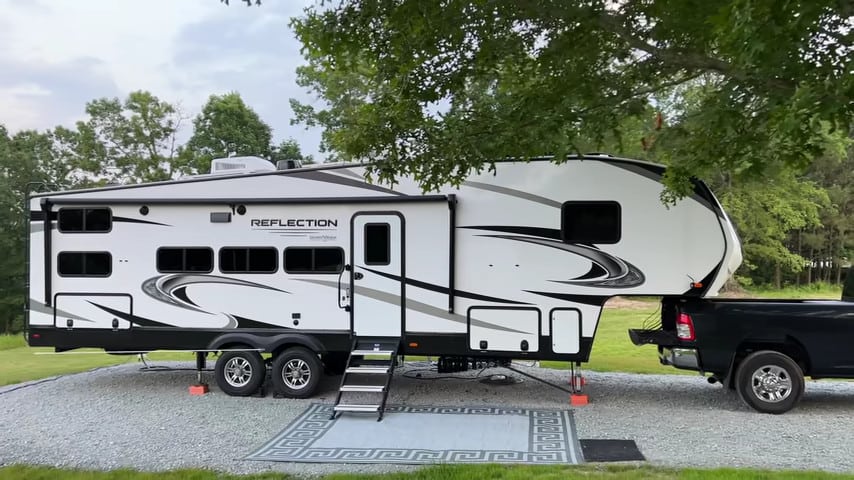
There are a few things to keep in mind when setting up your travel trailer and truck for a long drive and improving things like fuel efficiency while reducing gradual wear and tear on the pickup truck or the travel trailer.
- Balance the load for better hitch weight: More than one casual camper packer has suffered a damaged shackle and hanger while pulling their overloaded travel trailer down the road. The hitch weight of a travel trailer has an enormous impact on the suspension and safe towing capabilities of the pickup truck that’s towing it.
- Cross-connect the safety chains: Each travel trailer has a set of safety chains that are integrated into the tongue assembly. While you can connect them parallel to each other to the rear of the truck and be safe, you will have less risk of a problem if you cross-connect them in an X to the back of the car.
- Test the wiring harness: Wiring harness components on the truck and travel trailer can be prone to corrosion and other problems, especially if they are being stored outdoors. Before going on any trip, you should check to make sure all the brake lights and indicators are working correctly.
Legal Requirements and Regulations for Towing Travel Trailers

The legal requirements that regulate the towing of camper trailers are another critical area to consider.
Thai varies by jurisdiction, so you may have to check in with your local laws.
However, requirements like registration of the rig, insurance, and maximum capacity are usually general stipulations.
Your camper trailer has to be registered with the relevant authority, and this is evident in the registration plate on the rig.
Also, it is ideal to have insurance coverage for the trailer.
Most jurisdictions, Australia, for example, stipulate 80% of the vehicle’s towing capacity as the maximum threshold.
You can learn from World Population Review about the specific rules that all different kinds of trailers have to follow for the state you currently reside.
Special Features To Look For In A Tow Vehicle
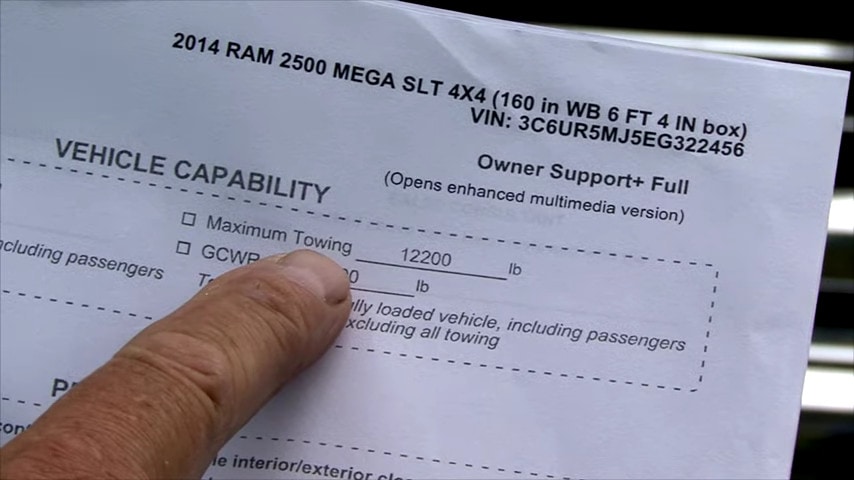
Of course, there is more to an effective tow vehicle than just the pickup truck’s maximum towing capacity.
Other unique features and options will play into how the truck performs on the road while under load.
You usually see them in “Tow Packages” that are associated with a particular make and model’s trim level.
1. Heavy-Duty Shocks Or Springs
Some trucks have heavy-duty shocks in the rear, though many have leaf springs. Both can influence the rear suspension when under load.
It is a significant factor that influences both payload capacity as well as the maximum hitch weight.
2. Universal Receiver Hitch
Some pickup trucks with a standard package trim level will just have a ball on the bumper.
The best tow packages come with a universal receiver hitch that is installed into the rear frame of the truck.
This lets you quickly switch the ball of the hitch to the trailer you are towing.
This is ideal if you happen to have an equipment trailer or a boat trailer that you might need to tow when you aren’t pulling your travel trailer camper.
3. Transmission Oil Coolers
Towing anything places increased stress on the engine and other components in the engine bay. This often translates to excess heat.
Especially in the pickup truck’s transmission. A Transmission oil cooler helps keep the transmission fluid from breaking down, which can reduce your risk of transmission damage that can build up over time.
4. Trailer Brake Controls
There are many new travel trailers and equipment trailers that come with some sort of electric braking assist system. With these, a particular line in the wiring loom coordinates with accessory brakes on the travel trailer.
When you press the brake pedal on the truck, it also activates the brakes in the travel trailer.
This reduces stress on the truck, the tongue of the travel trailer, the hitch, and other vital components.
It is beneficial for somewhat older travel trailers that can sometimes be prone to stress fractures in the nose caused by repeated jarring from stopping and starting.
5. A Secondary Fuel Tank
Towing a travel trailer, especially a heavy one, will reduce the pickup truck’s fuel efficiency.
Having a secondary fuel tank in the tow vehicle that you can switch over to will reduce the number of refueling stops you need to make.
It’s convenient if you are the sort of person who likes to boondock off the grid for days at a time and doesn’t want to drive to a potentially distant town just to refuel.
In this video, Jared Gills dramatizes these safety steps and how you can do them when setting up your truck and trailer:
What Truck is Best for Towing a Travel Trailer?
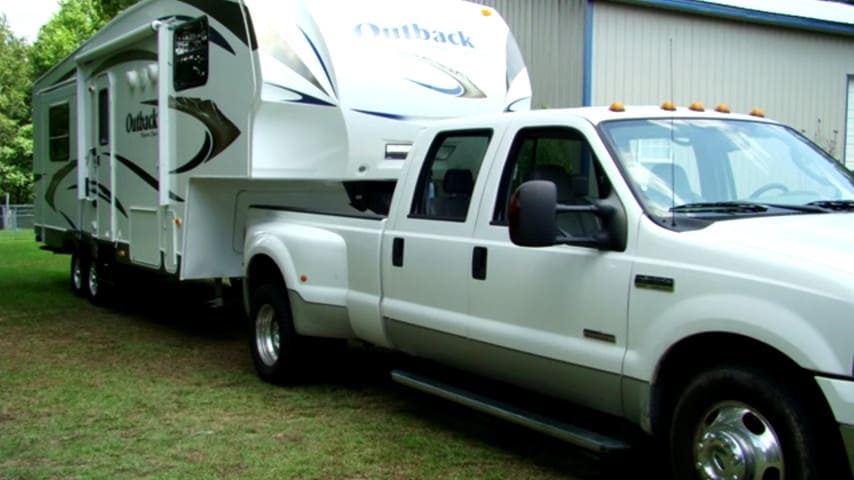
In the United States and Canada, domestic trucks from Ford, General Motors, and Dodge are the most common tow vehicles chosen to pull travel trailers.
In recent years, Toyota and Nissan have started making a name for themselves in this niche.
Each of these makes and models also has different trim levels and two packages that can affect their ability to tow a travel trailer.
The following are some baseline statistics for mid-trim levels on some of the most popular domestic half-ton pickup trucks. It’s not the be-all-end-all choice, but these models are an excellent place to start shopping.
| Category | Truck Model | Towing Capacity | Payload |
| Best Half-Ton Pickup Trucks For Towing A Travel Trailer | The Ford F-150 | Base: 7,700, Max: 13,200 | Base: 1,990, Max: 3,270 |
| Best Three-Quarter Ton Pickup Trucks For Towing A Travel Trailer | Chevrolet Silverado 2500 | Max: 20,000 | Base: 2,047, Max: 6,610 |
| One Ton Pickup Trucks For Towing | Ford F350 | Max. conventional: 21,200 | Base: 2,990, Max.: 7,850 |
The Best Half-Ton Pickup Trucks For Towing A Travel Trailer
Half-ton pickup trucks are trendy for tradespeople and athletes alike. Most have gasoline engines and might serve as a daily driver.
This makes them a popular place to start shopping when you are looking to pair one with your travel trailer.
Most half-ton pickup trucks can typically tow up to 7,000 pounds. However, when we apply the rule of staying within 80% of the maximum towing capacity, it’s wise to keep it to 6,500 to 6,000 pounds or less for a GVWR travel trailer.
The Ford F-150
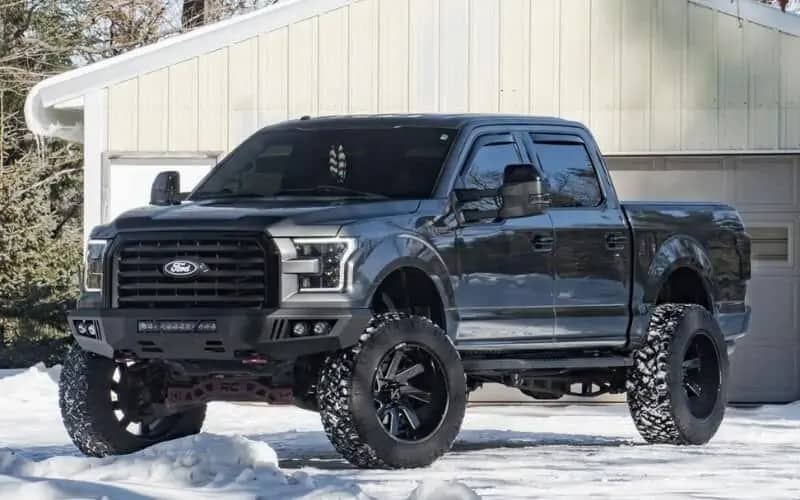
- Base towing capacity: 7,700
- Max. towing capacity: 13,200
- Base payload: 1,990
- Max. payload: 3,270
Ford has undergone some changes in recent years to embrace 21st Century vehicle expectations for fuel efficiency and material build quality.
However, the Ford F-150 remains one of the best-selling trucks in history.
Their new Eco Boost engine has taken away a little bit of the F-150’s base towing capacity, though it still has an impressive maximum towing capacity.
The Chevrolet Silverado & GMC Sierra 1500

- Base towing capacity: 6,800
- Max. towing capacity: 13,400
- Base payload: 1,600
- Max. payload: 2,110
While they have different badges, exterior styling cues, and different interior comfort features, these two half-ton trucks from General Motors are essentially the same when it comes to towing capabilities.
While they do have a little bit lower of a base towing capacity, you also do tend to get a little bit better MPG rating than some of the apples-to-apples competitors in the domestic truck market.
The RAM 1500
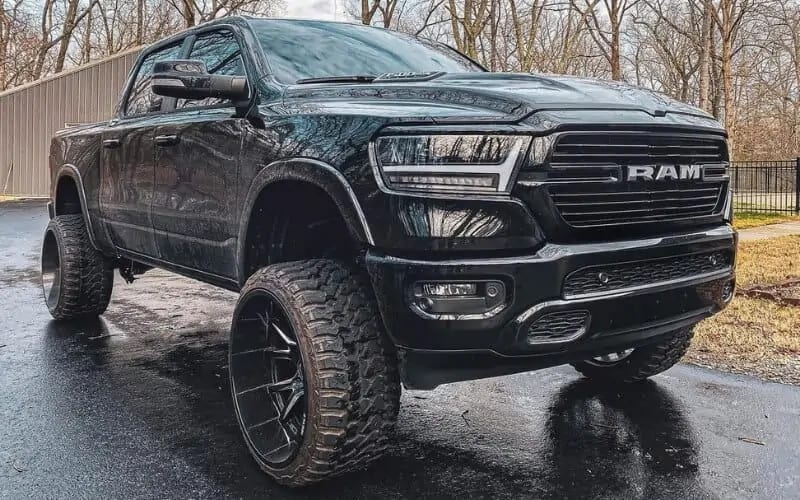
- Base towing capacity: 6,390
- Max. towing capacity: 12,750
- Base payload: 1,200
- Max. payload: 2,300
Dodge has also undergone some 21st Century reinvention with their lineup of half-ton pickup trucks.
This translates into superior low-end torque, which could be preferable if you need a tow vehicle that can pull a travel trailer up challenging hills or you have a boat, and you need to pull it out of steep, rustic boat launches.
The Nissan Titan
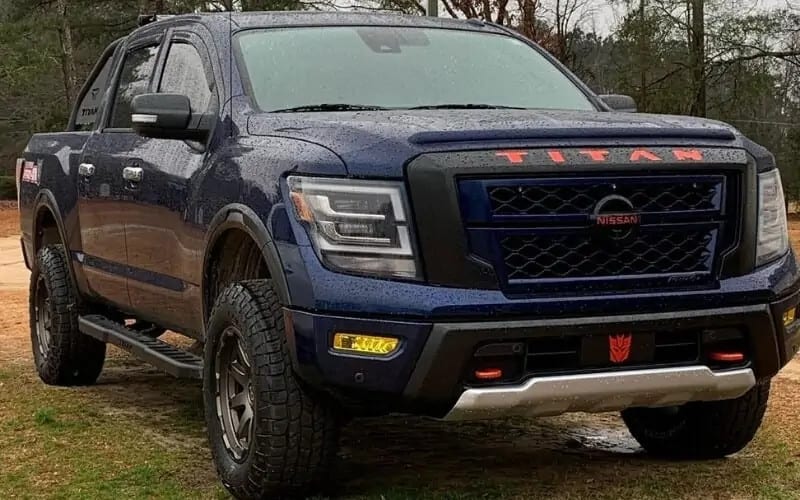
- Base towing capacity: 9,210
- Max. towing capacity: 9,370
- Base payload: 1,580
- Max. payload: 1,680
This is Nissan’s equivalent of a half-ton truck. It has a reputation for handling well and has good acceleration.
However, some argue that it’s not meant for rugged treatment like some domestic models.
The Toyota Tundra
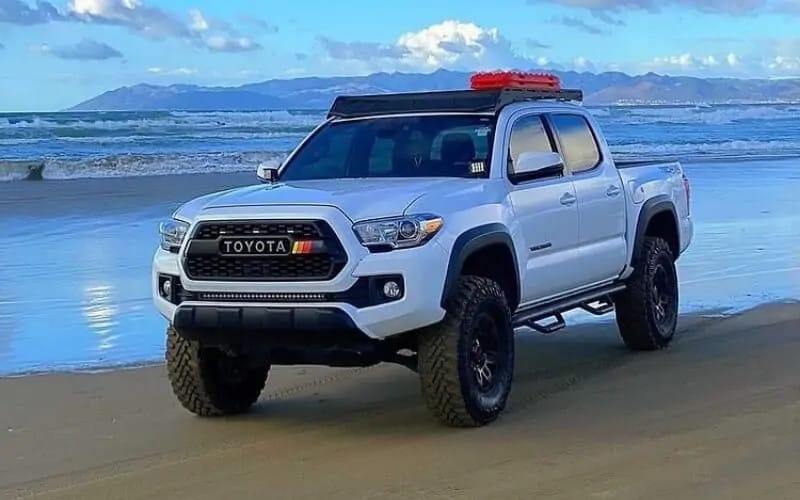
- Base towing capacity: 9,200
- Max. towing capacity: 10,200
- Base payload: 1,560
- Max. payload: 1,730
Now made in the USA, the Toyota Tundra is a somewhat newcomer to the world of half-ton pickup trucks.
It has Toyota’s reputation for reliability and a lot of the rugged feel that you get from a domestic pickup truck from Ford, General Motors, or Dodge.
The Best Three-Quarter Ton Pickup Trucks For Towing A Travel Trailer
Three-quarter-ton pickup trucks are the next step up from half-tons. They tend to be more robust in suspension, transmission, and other essential towing features.
A lot of them have heavy-duty diesel engines that further produce superior torque. However, this does mean that they have a much higher price tag.
Three-quarter-ton trucks can tow much more than half-tons. In general, you can safely tow a travel trailer with a gross vehicle weight rating of 10,000 to 12,000 pounds.
Though there are certainly some models and trim levels that can tow even more than that safely.
The Ford Super Duty F-250
- Max. towing capacity, conventional: 18,200
- Base payload: 3,040
- Max. payload: 4,160
The Ford Super Duty F-250 departs from the Eco Boost engineering with a powerful diesel engine.
This dramatically increases the maximum towing capacity and maximum payload. Though, as you can imagine, it also raises the price.
There is more than enough power here to pull most travel trailers as well as fifth-wheel trailers.
The Chevrolet Silverado 2500 & The GMC Sierra 2500
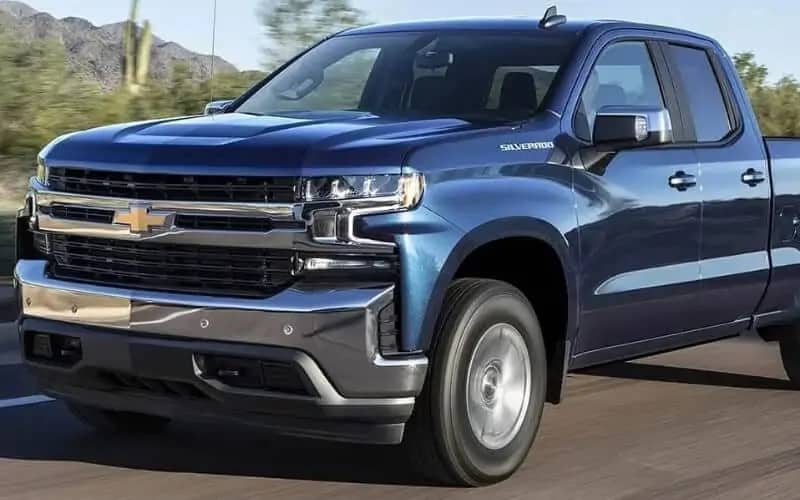
- Max. towing capacity, conventional: 20,000
- Base payload: 2,047
- Max. payload: 6,610
Here again, we have two different models from the same truck manufacturer.
Underneath the hood, you find the same powerful diesel engine that makes the Chevy Silverado 2500 and the GMC Sierra 2500 so popular for towing heavy travel trailers and fifth-wheel trailers
The Ram 2500
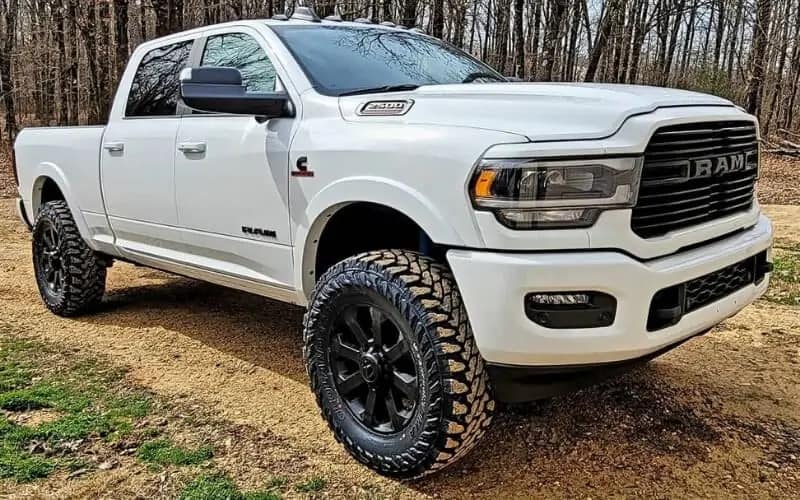
- Max. towing capacity, conventional: 10,580
- Base payload: 1,620
- Max. payload: 4,010
There are two different engines for the Ram 2500. You can choose a gasoline 6.4 Liter V8 Or a 6.7 Liter 6-cylinder diesel.
It’s also worth noting that Nissan used to offer an XD version of the Titan, which had commanding towing statistics. However, they stopped production in 2019 and have slowly been phasing it out of the tow vehicle market.
One Ton Pickup Trucks For Towing
For people who don’t want to take chances, a one-ton pickup truck certainly fits the bill.
These monsters of the road have massive diesel engines that can pull staggering amounts of weight.
Pretty much all of them come with optional 4-wheel drive, which helps conquer challenging terrain and steep inclines while under load.
However, all this power does come with a pretty steep price tag. One-ton heavy trucks can tow over 12,000 to 15,000 pounds, which puts pretty much all heavy travel trailers and most fifth-wheel trailers in their commanding range.
The Ford F350

- Max. towing capacity, conventional: 21,200
- Base payload: 2,990
- Max. payload: 7,850
The Ford F350 is a powerful one-ton pickup truck that is often used by construction workers who need to tow heavy-duty equipment trailers or fifth-wheel trailers.
It’s also commonly found in the agricultural sector pulling livestock trailers and other heavy-weight farm equipment from Point A to Point B.
Of course, this puts it in range to tow even the heaviest of RV travel trailers.6.7 Liter 6-cylinder diesel.
The Chevrolet Silverado & GMC Sierra 3500
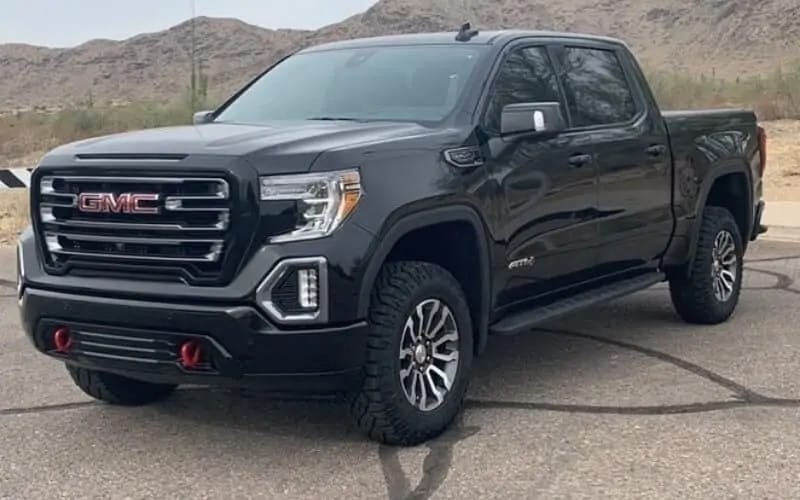
- Max. towing capacity, conventional: 21,200
- Base payload: 2,990
- Max. payload: 7,850
Here again, we have two nearly identical trucks from General Motors. Only the external styling, badges, and comfort features differ.
Otherwise, they are both mighty towing machines with diesel engines.
The Chevrolet Silverado is more popular, and you are more likely to get a better resell value later on if you are buying new.
The Ram 3500
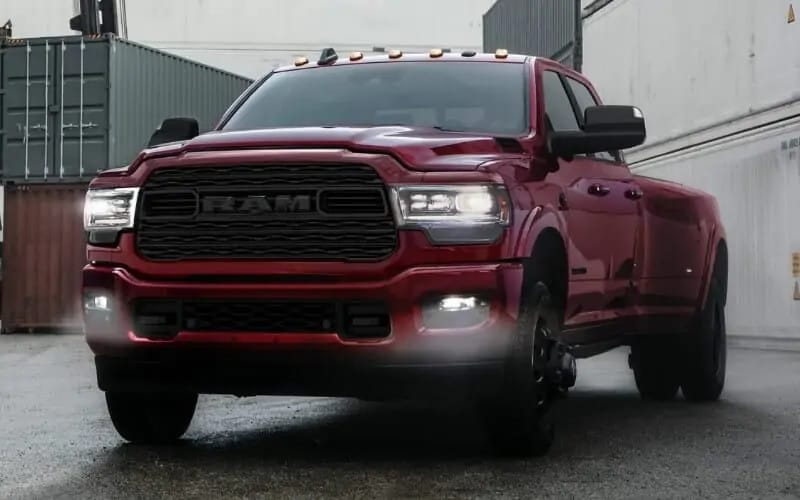
- Max. towing capacity, conventional: 18,000
- Base payload: 4,110
- Max. payload: 7,680
Ram is another highly competitive domestic truck manufacturer that continually manages to take a bite out of Ford and General Motors’ pieces of the market share.
The Ram 3500 has a powerful diesel engine, just like Ford and General Motors’ offerings in this niche.
However, they tend to have a higher payload capacity in their beefed-up rear suspension as well as impressive low-end torque.
This makes the Ram 3500 popular for towing fifth-wheel trailers, as well as travel trailers that need to tackle steep terrain.
There are even a few full-size SUVs that can tow an average travel trailer—especially some of the lighter models, which might only have a dry weight of 2,000 pounds.
Though there are certainly some behemoths that are loaded with extra features, massive water storage tanks, and stretch beyond 30 feet in length.
These travel trailers, when fully loaded, can tip the scales with a gross vehicle weight rating of over 10,000 to 12,000 pounds.
The bottom line is that if you are looking for a travel trailer with a gross vehicle weight rating of 3,500 to 6,000 pounds, then most of the half-ton pickup trucks like the Ford F-150, the Chevy Silverado, GMC Sierra, Toyota Tundra, RAM 1500, and the Nissan Titan might be the best option.
FAQs
What size truck do I need to pull a 30-foot camper?
For a 30-foot camper, you’ll generally need a truck with a towing capacity of at least 7,000 to 10,00 pounds, depending on the trailer’s weight. Popular choices for towing a 30-foot camper include light-duty trucks like the Ford F-150, Chevrolet Silverado 1500, and Ram 1500.
How big of a camper can I pull with a ½ ton truck?
A typical half-ton truck, also known as a light-duty truck, can tow a camper weighing between 5,000 to 13,000 pounds of towing capacity and Payload between 1,000 and 2,000 pounds.
How do you determine if your truck can pull a trailer?
To determine if your truck can pull a trailer, consider its towing capacity, which the manufacturer specifies. Ensure the towing capacity exceeds the trailer’s weight and factor in additional weight for passengers, cargo, and equipment.
Are camera systems critical for a truck towing a travel trailer?
These days, more and more pickup trucks are coming with blind spots and other innovative camera systems.
A backup camera system can certainly help with backing your travel trailer into a tight campsite or lining up the hitch with the tongue of the travel trailer.
Especially if you are working alone or without a competent spotter to help guide you.

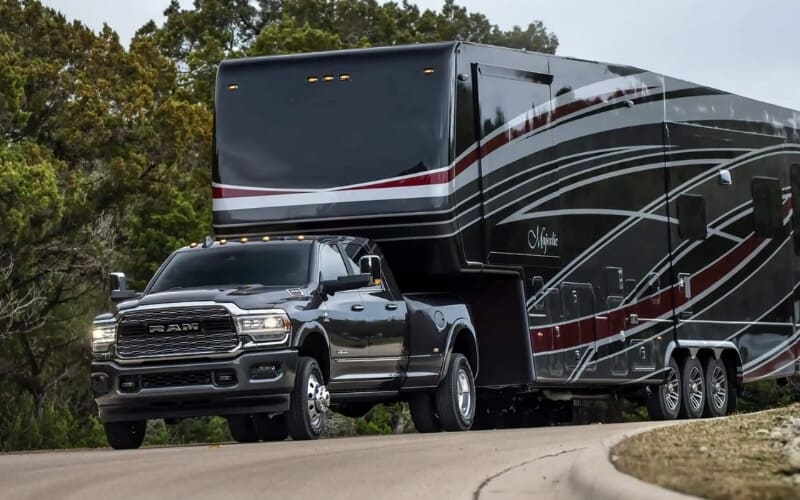


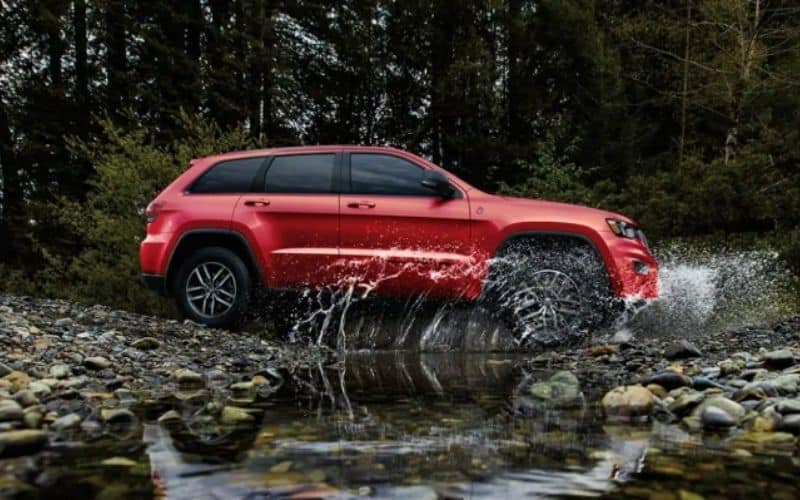
![8 Best SUVs for Towing Travel Trailer in [currentyear]: Top Rated SUV for Towing 5 Best SUVs For Towing A Travel Trailer](https://www.rvingknowhow.com/wp-content/uploads/2020/05/Best-SUVs-For-Towing-A-Travel-Trailer.jpg)

3 Comments
Mike
3 years agoHello Aaron,
I have a 2015 F150 Lariat FX4 3.5L 5.5’ bed, Ecoboost with Max tow package, 3.55 gear, and GVWR 7,000lb. I read in the 2015 Ford trailer guide ~11,500 lbs? Using the 80% rule would get me a trailer of up to 9,200 lbs.
Is this correct?
Thank you!
Mike
Aaron Richardson
3 years agoYes, but this includes passengers, cargo, and the fuel, including the attached travel trailer.
AK Fish
3 years agoPayload/cargo capacity for 2015 Ford F150 with 3.5L ranges from 1,496# (17″ tires) to 2,780# (18″ tires) depending on model (2015 FORD Towing Guide). You subtract the weights of the people, cargo, animals, gear in cab and bed, etc. to arrive at final maximum tongue load number (at 10% of the maximum wt. of the trailer). You will be surprised how close it will be. FORD guide also lists Hitch Receiver Weight Capacity (maximums) for F150: bumper hitch – TRAILER 5000#, Max wt. Tongue load 500#. Weight Distribution Hitch: TRAILER 12,200#, Max. Tongue load 1,220#.
I have a 3/4 ton 4wd crew cab std. bed 6.0L pickup (ideally rated to tow 13,000# HAH! not in this lifetime) weighing in at 7,600# before I add anything. 2,625# payload which conflicts with the 9,500# GVWR maximum. I go by the GVWR. 9500-7600 = 1,900# actual payload number. 7000# maximum wt. of trailer (if fully loaded) Use the 10% rule = 700# tongue wt. brings down my payload to 1,200#. Subtract my wt. 255#, 150# for wife, 100# for 2 dogs, 110# for generator, 50# for ice/cooler, 30# of gas for generator = 695# from 1,200# is 505# left for firewood, fishing poles, waders, dog food, tools, backpack full of fishing hooks and wts. camp table, chairs etc. I am probably below the max GVWR with a 2018 Chevrolet Silverado 2500HD crew cab when I go camping but I have never weighed it while towing the trailer at the scale house. The dry wt. of the trailer is 4795# before adding food, water, clothes, dishes, pots, pans, cleaning supplies, bedding, blocks, black/drinking water hoses, adapters, gloves, etc…. I would never consider a 1/2 ton pickup in my case. But to each their own.